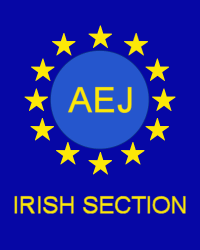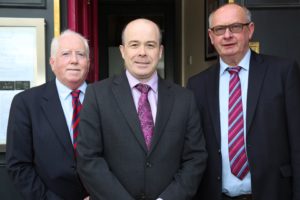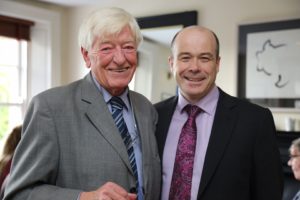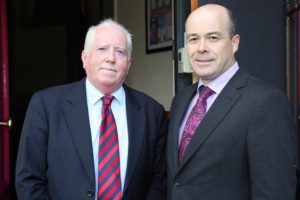Speech by the Minister for Communications, Climate Action and Environment, Denis Naughten TD, at the AEJ Lunch, Thursday, October 13th, 2016.
Within a few weeks of taking office I announced that I wouldn’t be seeking to introduce a Household Broadcasting Charge in the short term. The Household Broadcasting Charge is seen by many as the long-term solution to funding Public Service Broadcasting by ensuring that there is a stable flow of funding available to the sector.
– It would have been easy for me to put a decision on the ‘long finger’ by leaving it to the next administration.
– The bottom line is that there was no point in doing that. I made a judgement, which I believe is the correct one, that the Oireachtas would not pass legislation introducing a Household Broadcasting charge, in any form.
– The public and political response to the introduction of Water Charges makes it clear that there is no appetite for the introduction of another charge, and in fact I believe that more damage would be done to the broadcasting sector if I attempted to force the legislation through.
What is the financial position of RTÉ?
– As you are all well aware, RTÉ is funded through a mix of licence fee revenues and commercial revenues obtained largely from advertising. The broadcasting sector in general has been facing a very challenging environment over the past number of years with a substantial fall in advertising revenues.
– This has had a significant impact on the financial position of RTÉ and a consistent reduction in licence fee revenue, has resulted in a decline of over €100 million in RTÉ’s overall revenue since 2008.
– There will always be friction between the public service broadcaster and Government from time to time about how certain stories are covered, but I believe that a strong RTÉ is vital to the future of broadcasting in Ireland and by extension, vital to the future of Journalism in Ireland.
– The independence of public service broadcasters is a cornerstone of all functioning modern democracies. This includes editorial and financial independence.
– This is why I fully intend to introduce measures aimed at providing support in the short term to RTÉ and other Irish broadcasters.
What did I do for Public Service Broadcasting in the Budget?
– I announced in Budget 17 that I secured an additional €6 million allocation for RTÉ. This begins the process of reversing the cuts in public funding that the public service broadcasters were subject to over the last few years and recognises the huge contribution that they have made towards ensuring the success of the 2016 commemorations.
I also announced that a total of €8 million will be invested to facilitate the reallocation of the700mhz spectrum away from TV broadcasting to support our broadband and mobile telephony plans. This means a very valuable spectrum band is being freed up to deliver better mobile data services including 5G particularly in rural areas.
– This additional radio spectrum is to be made available by June 2020 for use by the mobile broadband sector.
What am I going to do for Public Service Broadcasting over the next few months?
– If you rule out introducing a new charge – while it dramatically reduces the options available to increase funding to public service broadcasters – there is scope for examining other aspects of the PSB funding model which could benefit the sector in the medium term.
– I’ve asked my Department to look at all the options available to me, and I’ll be bringing a memorandum to Government shortly which will outline my position on what steps are required to assist RTÉ and public service broadcasting.
– The list of options will not surprise many of you, but it includes measures aimed at improving the way in which the TV licence is collected and enforced, changes in the definition of a television set so that the legislation is more fit for purpose given recent technological advances, and further examination of the amendments brought in during the economic downturn to the licence fee model.
– It is my hope, that this suite of changes, if implemented, will give the PSB enough breathing space over the next few years. However I accept that it will not solve the long term problems.
Where does that leave Public Service Broadcasting?
– What does Public Service Broadcasting mean to Irish citizens? What services should the PSBs be delivering five years from now or ten years from now? These are among the questions that we have to ask ourselves at this point. If we can start building a consensus on what the answers are, we can then start considering what steps must be taken to achieve the results we want to achieve.
– It is often very easy for an issue such as broadcasting to become a political football, which is kicked back and forth every election to the detriment of all those involved. What I believe the sector requires is consistency, and to do that we require consensus across the Dáil.
– Along with the suite of measures I’ll be bringing to Government, I intend to write to the Joint Oireachtas Committee on Communications, Climate Action and Environment asking them to start the conversation with the public and with all stakeholders so that we can determine the answers to the questions that are circling PSB at the moment. This is primarily on the question of how best to fund them in the longer term; a question that still needs to be answered, particularly if there is to be no Household Broadcasting Charge.
Media Plurality & Diversity
– Among the more recent developments in the Media sector in Ireland has been the introduction of the Media Mergers regime. This regime was introduced by the Competition and Consumer Protection Act 2014.
– What this means is that any merger or acquisition between two or more entities that carry on a “media business” in the State (or where one entity carries on a “media business” in the State and one carries on a “media business” outside the State) must be notified to me once it has been cleared on Competition grounds by the Competition and Consumer Protection Commission.
– My Department must then examine the merger or acquisition on plurality and diversity grounds and I must then decide, based on the advice of my officials, whether a merger is good or not for media plurality in the State. I may, following my Department’s initial examination, refer the matter to the BAI for a full examination.
– Some of you may have questions about mergers that my Department is considering at the moment.
– I’m afraid I’m going to have to ruin some of your questions later by stating clearly at this stage that I can’t comment on any individual case.
– I can say that I am a strong believer in media plurality being at the core of any democracy, and that I am pleased to see that this is a subject which is being explored further at a European level by the Centre for Media Pluralism and Media Freedom in Florence.
Community and Local Journalism
– One of the more negative comments that I’ve heard about the Programme for Government is that it is a “culchies’ charter”. I disagree strongly with that view, because I believe that the PFG is a communities’ charter, and I truly believe that in order for communities to function properly, they must have active community and local journalism in order to focus on the needs of each specific community.
– Community Radio is one of the things that we do very well in Ireland, although it has been largely forgotten about in the conversations on funding over the last few years. In a way, the situation with community radio is a microcosm of the larger PSB picture. We need to ask ourselves what we want Community Radio to deliver, and what we want Community Radio to look like in five years’ time and in ten years’ time. I have asked my officials that I a special focus be given to Community Radio in the Department’s work in this area.
– Local newspapers and press are just as important as Community Radio, but I must indicate clearly that my functions do not currently extend to newspapers, whether national or local. We know how quickly the local newspaper sector has declined over the past number of years, and how the viability of the sector is under threat.
– Perhaps similar to the approach I am suggesting to Public Service Broadcasting, an examination of the local newspaper sector is required, to identify what it is we as a country want local newspapers to deliver, and what steps must be put in place to deliver that.
Conclusion
I hope I’ve given you a taste of the relationship between journalists and journalism and my role as Minister for Communications. I’d like to thank you once again for welcoming me here today, and I look forward to answering a few of your questions
I’ll start with Public Service Broadcasting. Within a few weeks of taking office I announced that I wouldn’t be seeking to introduce a Household Broadcasting Charge in the short term. The Household Broadcasting Charge is seen by many as the long-term solution to funding Public Service Broadcasting by ensuring that there is a stable flow of funding available to the sector.
– It would have been easy for me to put a decision on the ‘long finger’ by leaving it to the next administration.
– The bottom line is that there was no point in doing that. I made a judgement, which I believe is the correct one, that the Oireachtas would not pass legislation introducing a Household Broadcasting charge, in any form.
–
– The public and political response to the introduction of Water Charges makes it clear that there is no appetite for the introduction of another charge, and in fact I believe that more damage would be done to the broadcasting sector if I attempted to force the legislation through.
What is the financial position of RTÉ?
– As you are all well aware, RTÉ is funded through a mix of licence fee revenues and commercial revenues obtained largely from advertising. The broadcasting sector in general has been facing a very challenging environment over the past number of years with a substantial fall in advertising revenues.
– This has had a significant impact on the financial position of RTÉ and a consistent reduction in licence fee revenue, has resulted in a decline of over €100 million in RTÉ’s overall revenue since 2008.
– There will always be friction between the public service broadcaster and Government from time to time about how certain stories are covered, but I believe that a strong RTÉ is vital to the future of broadcasting in Ireland and by extension, vital to the future of Journalism in Ireland.
– The independence of public service broadcasters is a cornerstone of all functioning modern democracies. This includes editorial and financial independence.
– This is why I fully intend to introduce measures aimed at providing support in the short term to RTÉ and other Irish broadcasters.
What did I do for Public Service Broadcasting in the Budget?
– I announced in Budget 17 that I secured an additional €6 million allocation for RTÉ. This begins the process of reversing the cuts in public funding that the public service broadcasters were subject to over the last few years and recognises the huge contribution that they have made towards ensuring the success of the 2016 commemorations.
I also announced that a total of €8 million will be invested to facilitate the reallocation of the700mhz spectrum away from TV broadcasting to support our broadband and mobile telephony plans. This means a very valuable spectrum band is being freed up to deliver better mobile data services including 5G particularly in rural areas.
– This additional radio spectrum is to be made available by June 2020 for use by the mobile broadband sector.
What am I going to do for Public Service Broadcasting over the next few months?
– If you rule out introducing a new charge – while it dramatically reduces the options available to increase funding to public service broadcasters – there is scope for examining other aspects of the PSB funding model which could benefit the sector in the medium term.
– I’ve asked my Department to look at all the options available to me, and I’ll be bringing a memorandum to Government shortly which will outline my position on what steps are required to assist RTÉ and public service broadcasting.
– The list of options will not surprise many of you, but it includes measures aimed at improving the way in which the TV licence is collected and enforced, changes in the definition of a television set so that the legislation is more fit for purpose given recent technological advances, and further examination of the amendments brought in during the economic downturn to the licence fee model.
– It is my hope, that this suite of changes, if implemented, will give the PSB enough breathing space over the next few years. However I accept that it will not solve the long term problems.
Where does that leave Public Service Broadcasting?
– What does Public Service Broadcasting mean to Irish citizens? What services should the PSBs be delivering five years from now or ten years from now? These are among the questions that we have to ask ourselves at this point. If we can start building a consensus on what the answers are, we can then start considering what steps must be taken to achieve the results we want to achieve.
– It is often very easy for an issue such as broadcasting to become a political football, which is kicked back and forth every election to the detriment of all those involved. What I believe the sector requires is consistency, and to do that we require consensus across the Dáil.
– Along with the suite of measures I’ll be bringing to Government, I intend to write to the Joint Oireachtas Committee on Communications, Climate Action and Environment asking them to start the conversation with the public and with all stakeholders so that we can determine the answers to the questions that are circling PSB at the moment. This is primarily on the question of how best to fund them in the longer term; a question that still needs to be answered, particularly if there is to be no Household Broadcasting Charge.
Media Plurality & Diversity
– Among the more recent developments in the Media sector in Ireland has been the introduction of the Media Mergers regime. This regime was introduced by the Competition and Consumer Protection Act 2014.
– What this means is that any merger or acquisition between two or more entities that carry on a “media business” in the State (or where one entity carries on a “media business” in the State and one carries on a “media business” outside the State) must be notified to me once it has been cleared on Competition grounds by the Competition and Consumer Protection Commission.
– My Department must then examine the merger or acquisition on plurality and diversity grounds and I must then decide, based on the advice of my officials, whether a merger is good or not for media plurality in the State. I may, following my Department’s initial examination, refer the matter to the BAI for a full examination.
– Some of you may have questions about mergers that my Department is considering at the moment.
– I’m afraid I’m going to have to ruin some of your questions later by stating clearly at this stage that I can’t comment on any individual case.
– I can say that I am a strong believer in media plurality being at the core of any democracy, and that I am pleased to see that this is a subject which is being explored further at a European level by the Centre for Media Pluralism and Media Freedom in Florence.
Community and Local Journalism
– One of the more negative comments that I’ve heard about the Programme for Government is that it is a “culchies’ charter”. I disagree strongly with that view, because I believe that the PFG is a communities’ charter, and I truly believe that in order for communities to function properly, they must have active community and local journalism in order to focus on the needs of each specific community.
– Community Radio is one of the things that we do very well in Ireland, although it has been largely forgotten about in the conversations on funding over the last few years. In a way, the situation with community radio is a microcosm of the larger PSB picture. We need to ask ourselves what we want Community Radio to deliver, and what we want Community Radio to look like in five years’ time and in ten years’ time. I have asked my officials that I a special focus be given to Community Radio in the Department’s work in this area.
– Local newspapers and press are just as important as Community Radio, but I must indicate clearly that my functions do not currently extend to newspapers, whether national or local. We know how quickly the local newspaper sector has declined over the past number of years, and how the viability of the sector is under threat.
– Perhaps similar to the approach I am suggesting to Public Service Broadcasting, an examination of the local newspaper sector is required, to identify what it is we as a country want local newspapers to deliver, and what steps must be put in place to deliver that.





